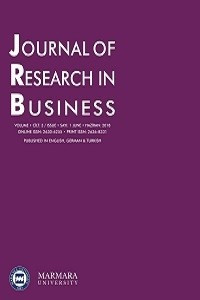DETERMINATION OF MARKETING COMMUNICATION STRATEGIES OF HOTELS USING RENEWABLE ENERGY
Abstract
In order to protect nature, clean energy sources obtained fromnature are required. Currently, the use of renewable energy is also important for the tourism sector. The purpose of this study is to identify the priorities and differences in marketing communication strategies that can be used in different country markets that prefer hotels with renewable energy. In line with this purpose of the study, the priority of Afyon İkbal Thermal Hotel&Spa in marketing communication strategies was analyzed by the TOPSIS method. Marketing communication strategies in US, UK and Netherlands, which mostly prefer renewable energy hotels in order to communicate messages that emphasize the renewable energy use of the tourism businesses in today's conditions with global environmental problems, have been considered based on 8 criteria and 4 alternatives. The criteria have been determined as cost, establishing corporate reputation, competitors' strategies, technological developments, the level of development of the target market, environmental awareness of consumers, consumer trends changing based on environment, and attitudes of agencies. Alternatives can be listed as advertisement, public relations and publicity, fair and promotion. As a result of this evaluation, advertising has been identified as the primary tool in all three markets.
Keywords:
Marketing Communication Strategies, International Markets Renewable Energy, Tourism, TOPSIS,
___
- Aguilera, M. J., Manzano-Agugliaro, F. & Montoya, F. G. (2014). Renewable energy production in Spain: A review. Renewable and Sustainable Energy Reviews, 33, 509–531. doi:10.1016/j.rser.2014.01.091
- Cevizci, D. & Kayacan, O. (2019). Bir Konfeksiyon İşletmesinde MACBETH ve TOPSIS Yöntemleri ile Tedarikçi Seçimi. Dokuz Eylül Üniversitesi Mühendislik Fakültesi Fen ve mühendislik Dergisi, 21(62), 331-344. doi:10.21205/deufmd.2019216202
- Hoogwijk, M. M. (2004). On The Global and Regional Potential of Renewable Energy SourcesN, (Unpublished PhD Dissertation), UTRECHT University, Utrecht. Retrieved from https://dspace.library.uu.nl/bitstream/handle/1874/782/full.pdf?sequence=1&isAllowed=y
- Liu, C. and Ning, H. (2014). Exploring the Differences in Destination Branding Toward International and Domestic Tourists Destination Image in Beijing, China (Unpublished Master’s Thesis), Högskolan Dalarna, Human Geography, Dalarna. Retrieved from https://www.diva-portal.org/smash/get/diva2:754423/FULLTEXT01.pdf
- Vourdoubas, J. (2016). Energy Consumption and Use of Renewable Energy Sources in Hotels: A Case Study in Crete, Greece Journal of Tourism and Hospitality Management, ResearchGate, 4(2):82. doi: 10.15640/jthm.v4n2a5
- Yayın Aralığı: Yılda 2 Sayı
- Başlangıç: 2016
- Yayıncı: Marmara Üniversitesi
Sayıdaki Diğer Makaleler
İŞTE MUTLULUK ÖLÇEĞİ (İMÖ): BİR ÖLÇEK GELİŞTİRME ÇALIŞMASI
ETKİNLİK, ETKİLİLİK, VERİMLİLİK, KÂRLILIK, PERFORMANS: KAVRAMSAL BİR ÇERÇEVE VE KARŞILAŞTIRMA
ALGILANAN SOSYAL DESTEĞİN İŞE YABANCILAŞMA ÜZERİNDEKİ ETKİSİNDE DOĞAL DAVRANIŞIN ARACILIK ROLÜ
İLAÇ SEKTÖRÜ ÜZERİNE BİR ÇALIŞMA: KAN SULANDIRICI İLAÇLARIN AHP YÖNTEMİ İLE SEÇİMİ
İŞ YAŞAMINDA AKTİVİZM: YÖNETİCİLERİN AKTİVİZME YÖNELİK GÖRÜŞLERİNİN DEĞERLENDİRİLMESİ
Erkan TAŞKIRAN, Gülşah GENÇER ÇELİK
ESTIMATION OF COBB – DOUGLAS PRODUCTION FUNCTION FOR DEVELOPING COUNTRIES
